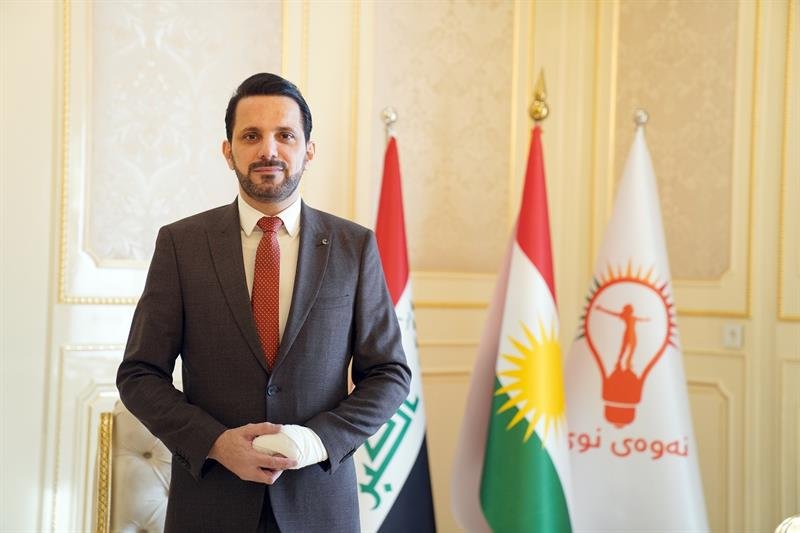New Generation Leader Shaswar Abdulwahid Detained in Sulaimani Ahead of Iraq’s November Elections

Shaswar Abdulwahid, leader of the largest opposition group in the Kurdistan Region, was arrested last night in Sulaimani under Article 431 of the Iraqi Penal Code, pursuant to an arrest warrant issued against him.
Context: Last week, Abdulwahid warned that if the KRG did not hand over oil and comply with its agreement with Baghdad to secure the transfer of employees’ salaries, his party would take escalatory measures. The Sulaimani police stated that there were complaints and an arrest warrant against him related to earlier cases. New Generation holds 15 seats in the Kurdistan Parliament and nine in the Iraqi Parliament, with Iraqi elections scheduled for November.
Analysis: The complaint appears to date back to 2019 but was renewed on the 4th of this month—just three months before the parliamentary elections. The timing raises questions, though the arrest may ironically benefit New Generation politically. It provides ideal campaign material and may encourage other opposition parties to increase their criticism of the two ruling parties. One of Abdulwahid’s consistent arguments has been that other opposition forces—particularly the Halwest Movement, whose voter base overlaps most directly with New Generation’s—are too close to the PUK. Halwest, in turn, has accused New Generation of shady deals and used Abdulwahid’s visit to Ankara and meeting with Turkey’s deputy foreign minister against him.
Abdulwahid has quietly built a working relationship with the Iraqi prime minister. Notably, his media outlet, NRT TV, has adopted a markedly different editorial tone toward the Iraqi government compared to its coverage of the KRG. While New Generation presents itself as an opposition force in both Erbil and Baghdad, NRT’s reporting has consistently portrayed Baghdad in a positive light, in stark contrast to its relentless criticism of the KRG.
Kurdish Political Landscape
Kurdistan Parliament Seats – Opposition Parties (out of 100 total seats)
- New Generation (15)
- Islamic Union (7)
- Hawlest (4)
- Justice Group (3)
- People’s Front (2)
- KDP/PUK & Others (69)
In March, we reported that the PUK was intensifying efforts to curb Abdulwahid’s business activities, allegedly in response to his recent diplomatic maneuvers. He had reportedly held meetings with Turkish officials and was close to striking a deal with the KDP to form a government excluding the PUK, before backing away under heavy pressure. Unverified reports claim the PUK reactivated multiple legal cases against him, with one court allegedly seizing projects worth 92 billion Iraqi dinars in Sulaimani.
At the same time, Abdulwahid has been securing business deals in Baghdad, seemingly as a strategy to shield himself from PUK pressure. Yet he has faced setbacks there as well, including the arrest of his brother on bribery and corruption charges. These developments could make him more susceptible to political leverage from various sides—significant, given that his party’s seats in both the Kurdistan and Iraqi parliaments give him potential influence in both arenas.
Before entering politics, Abdulwahid built his fortune through controversial methods. He sold shares in business projects with promises of high returns, initially delivering on those promises, which drew more investors. Many later lost their money when he stopped payments, citing failed projects—while his own wealth continued to grow. Critics describe this as a classic Ponzi scheme.
This background fuels skepticism over Abdulwahid’s political motives, with many seeing his financial success—and, by extension, his political career—as rooted in illegitimate gains. While allegations and complaints have trailed him for years, serious legal action has been rare.
This disillusionment extends beyond Abdulwahid himself. Many opposition-minded citizens feel betrayed. The Gorran Movement, once a formidable challenger to the KDP–PUK duopoly, was eventually co-opted, corrupted, and faded into irrelevance. Now, New Generation—hailed as the new hope for change—is facing its own allegations of misconduct and exploitation. The pattern has left many deeply cynical about the very idea of an effective, principled opposition in the Kurdistan Region.









